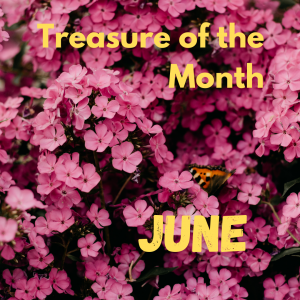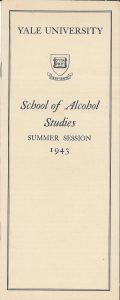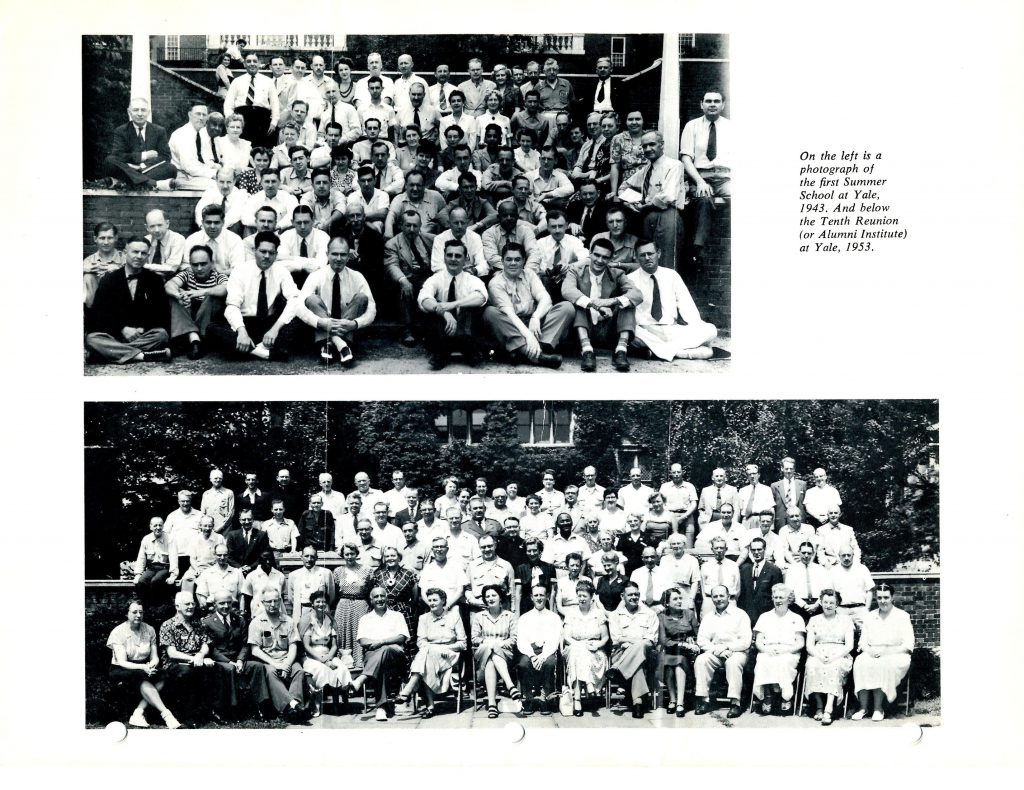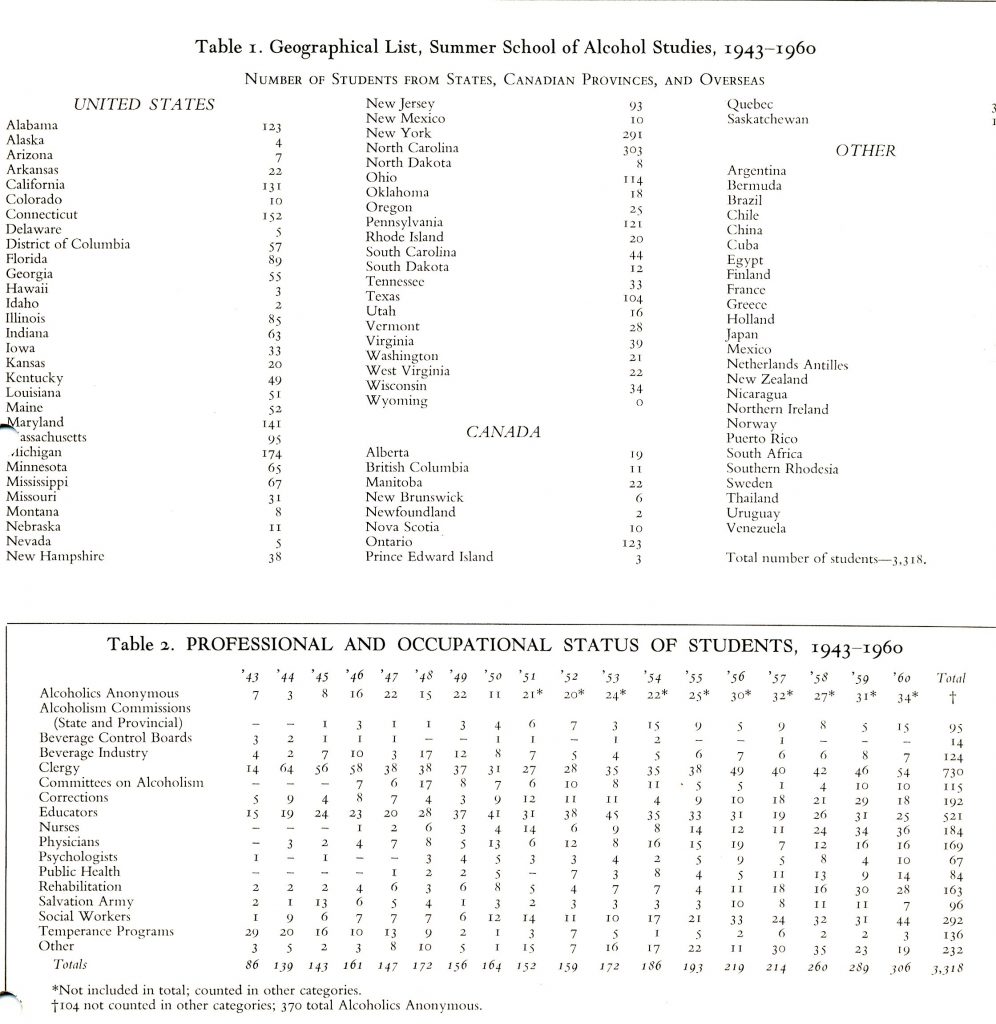 Eighty years ago it must have looked like a rather ambitious attempt to bring together a diverse group of people on the Yale University campus for a six-week summer program to learn about alcohol, its effect on the brain and body, the individual and society, from various scientific angles.
Eighty years ago it must have looked like a rather ambitious attempt to bring together a diverse group of people on the Yale University campus for a six-week summer program to learn about alcohol, its effect on the brain and body, the individual and society, from various scientific angles.
The First Summer School
 The Summer School of Alcohol Studies (SSAS) was founded in 1943 as a part of what would become the Center of Alcohol Studies at Yale, then at Rutgers. The first director, E. M. Jellinek, did not intend for the School to exist beyond that first summer and even expected the Center to lose money on the “experiment.”
The Summer School of Alcohol Studies (SSAS) was founded in 1943 as a part of what would become the Center of Alcohol Studies at Yale, then at Rutgers. The first director, E. M. Jellinek, did not intend for the School to exist beyond that first summer and even expected the Center to lose money on the “experiment.”
SSAS faculty could rely on a small number of researchers who were interested in alcohol at that time. However, they reached out to collaborate with members of the larger community (e.g., Alcoholics Anonymous, alcohol beverage industry representatives, clergy, criminal justice, education, medicine, Women’s Christian Temperance Union, and more) involved in the topic.
The 1943 School covered the important topics of the time, including problem drinking and alcoholism, the role of alcohol in society, laws related to alcohol availability, etc. See more in the 1943 SSAS Program Brochure.
More Than Just the Curriculum
The first curriculum was determined by the faculty of the Section of Alcohol Studies in the Laboratory of Applied Physiology, directed by Howard W. Haggard with Leon A. Greenberg as the co-director, which, expanding to include sociologists, psychologists, economists, and psychiatrists, later evolved into the present Center of Alcohol and Substance Use Studies (CAS).
The 1943 Summer School of Alcohol Studies was the first to offer a structured curriculum to participants from various backgrounds and disciplines too. As such, it had become a life-changing experience for many of them. The interaction between faculty and students inspired lively discussions, which also resulted in founding major organizations related to alcohol education, such as the National Committee for Education on Alcoholism, which became the National Council on Alcoholism, an endeavor by a famous student, Marty Mann. Another student, Brinkley Smithers was instrumental in helping the Center of Alcohol Studies (CAS) move from Yale University to Rutgers, and also, along with his wife, Adele Smithers, donated funds to expand the CAS building to its current format.
Sharing the Knowledge
Masters of information dissemination and public relations, CAS also took advantage of sharing the unique scientific content of the first SSAS in a book called Abridged Lectures of the First (1943) Summer Course on Alcohol Studies at Yale University. Published in 1944, this volume presents the abridged version of the lectures and seminars to satisfy popular interest expressed after the summer session by those unable to attend. It was soon followed by a more substantial publication called Alcohol, science and society in 1945, which published not only the lectures and seminars, but also added the discussions that followed them. The Table of contents illustrates the rich content of the Summer School along with the lecturers from all walks of life. As part of the Digital Alcohol Studies Archives, all lectures are now available in RUcore, the Rutgers University Community Repository.
SSAS and DEI
When I’m asked about the DEI component of the entire Digital Alcohol Studies Archives project, I present the Summer School as an example. It is the prototype of diversity, equity, and inclusion.

The photo of the Class of 1943 shows representatives of the disciplines and organizations that participated in the School. Though more than 250 individuals applied to attend the first School, only 80 could be accepted due to the size of the facility. For the next ten years, representatives of all alcohol-related areas attended as shown by the numbers at the end of this post.
About SSAS: Word of Mouth
From the Digital Alcohol Studies Archives
- View the 80th Anniversary Exhibit in the Summer School of Alcohol Studies Collection
- Browse all images of the Summer School of Alcohol Studies Collection in the Alcohol Studies Archives
- The first session of the Summer School of Alcohol Studies (1943) – Program brochure (includes titles and instructors of seminars along with general information)
- Browse all available program brochures
- Browse Abridged Lectures of the First (1943) Summer Course on Alcohol Studies at Yale University.
- Read the twenty-nine lectures in Alcohol, Science and Society chapter by chapter from the Alcohol Archive in RUcore, the Rutgers University Community Repository following the numbered titles below.
Table of contents
Foreword / Howard W. Haggard
-
- Introduction to the curriculum / E.M. Jellinek
- The problems of alcohol / E.M. Jellinek
- Metabolism of alcohol / Howard W. Haggard
- The concentration of alcohol in the blood and its significance, with a demonstration of the alcoholometer / Leon A. Greenberg
- The physiological effects of large and small amounts of alcohol / Howard W. Haggard
- Alcohol and nutrition: the diseases of chronic alcoholism / Norman Jolliffe
- Effects of small amounts of alcohol on psychological functions / E.M. Jellinek
- Drinking mores of the social classes / John Dollard
- Heredity of the alcoholic / E.M. Jellinek
- Children of alcoholic parents raised in foster homes / Anne Roe
- Theories of the alcoholic personality / Carney Landis
- Alcohol and aggression / Ralph S. Banay
- The functions of alcohol in primitive societies / Donald Horton
- Alcohol and complex society / Selden D. Bacon
- Some economic aspects of inebriety / Benson Y. Landis
- Excessive drinking and the institution of the family / Selden D. Bacon
- Alcohol and pauperism / A.J. Murphy
- Alcohol and traffic / Donald S. Berry
- Philosophy of the temperance movement: a panel discussion / Harry S. Warner, Francis W. McPeek and E.M. Jellinek
- The churches and alcohol / Roland H. Bainton
- Controlled consumption of alcoholic beverages / Edward G. Baird
- Legal aspects of prohibition / Edward B. Dunford
- Analysis of wet and dry propaganda / Dwight Anderson
- Penal handling of inebriates: a panel discussion / William H. Maltbie, Ralph S. Banay and Selden D. Bacon
- Medical treatment of the inebriate / Robert Fleming
- The role of religious bodies in the treatment of inebriety in the United States / Francis W. McPeek
- Social case work with inebriates / Sybil M. Baker
- Pastoral counseling of inebriates / Otis R. Rice
- The Fellowship of Alcoholics Anonymous / W.W. (one of the founders)


